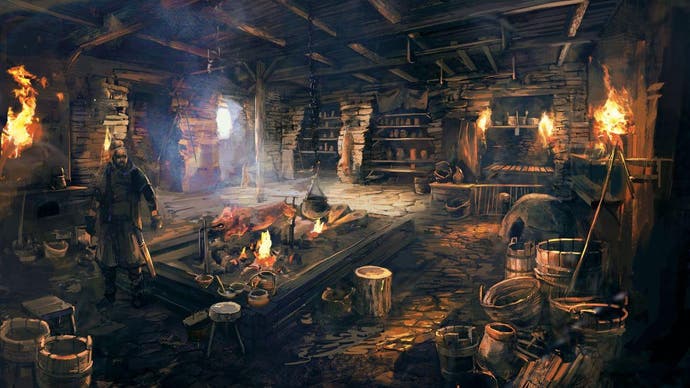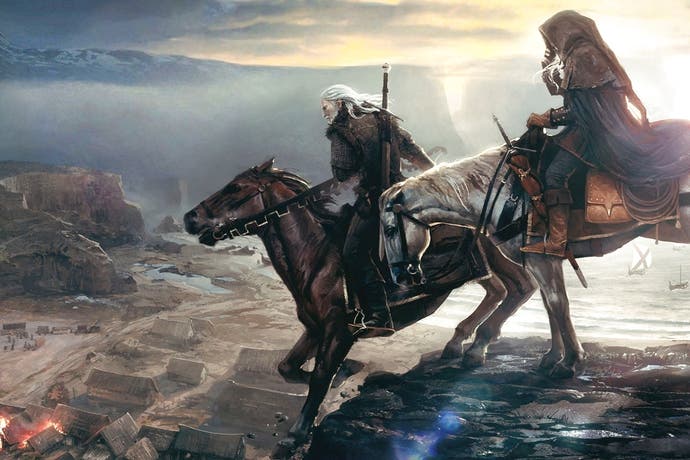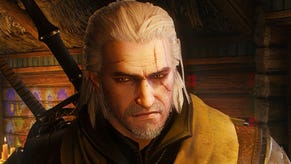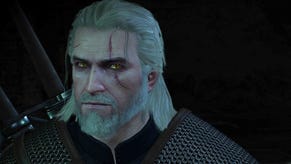The Witcher 3: The Skyrim debate, the game on PS4, nuggets of clarification and a whiff of multiplayer
"It's just words right now; we need to prove it."
The open world RPG yardstick is Skyrim. That's the game, the series, the success that The Witcher 3 has in its sights. And to listen to CD Projekt Red, you'd believe the Polish studio could better it.
Game director Konrad Tomaszkiewicz raised eyebrows when he said Skyrim's story and quests were often "generic". He said he couldn't name five characters from the game by memory, and he played the game a lot. His point was that The Witcher 3 could improve on that. It could be an open world RPG like Skyrim but with a strong story as well. It could be, he said, the "perfect RPG".
"He was harsh too much," reflected Adam Badowski, managing director of CD Projekt Red, when I spoke to him last week.
"What does it mean, generic? It's a different type of gameplay experience. We know how to make hand-crafted quests and we have tonnes of ideas for quests. It's a different level of detail.
"We have different tricks for how to fulfil - how to make the living world. And really it's not the same way Bethesda has. It's a different approach."
"Sorry," he chuckled, "but we are pretty confident we will make it."
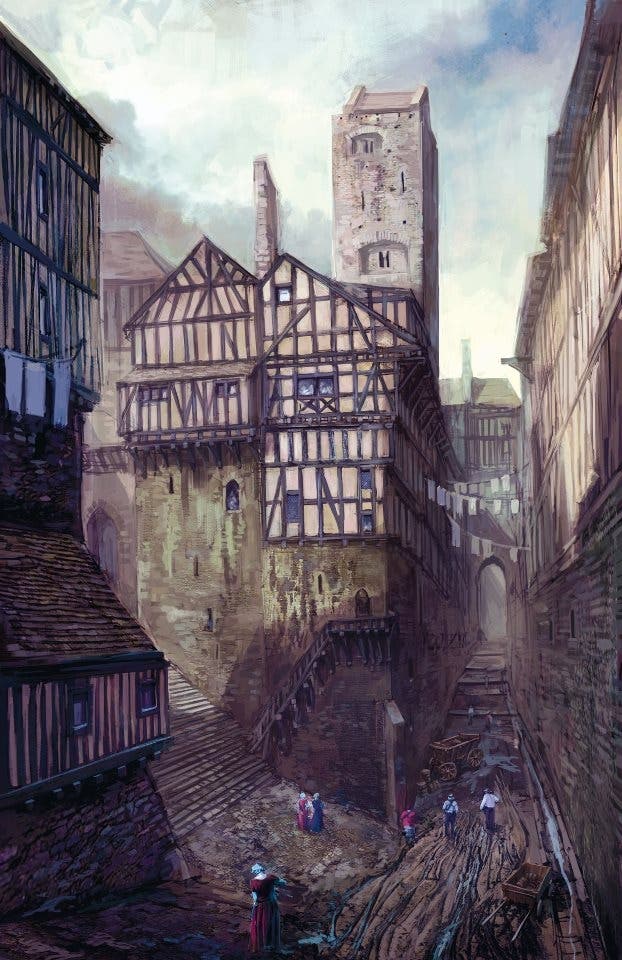
The Witcher 3 will have a whopping 50-hour main story. And if you want, you can extend that to over 100 hours by tackling side-quests. Skyrim play-times are regularly in the 100s of hours, but the emphasis - as Badowski pointed out - is on side-quests and exploration. Bethesda also uses procedural quest creation to fill its huge worlds with things for you to do. How else could it manage?
The Witcher 3 will have a 20 per cent bigger world than Skyrim's. But if Bethesda can't hand-craft all of its quests with a budget of $85 million, a team of 90, years of open world experience and a development time of three-and-a-half years, how will CD Projekt Red be able to?
"It's a matter of scale," answered Badowski. "Bigger team will achieve bigger goals.
"Don't expect too many sandbox, mechanical solutions in The Witcher 3. It will be hand-crafted very precisely."
Adam Badowski
"You have to remember that the team is much bigger and much more experienced. Right now we are on consoles and we have technology already established, we have all the story plots done, so it's not so bad."
Today, CD Projekt Red employs 150 people. They're split into three teams: one for The Witcher 3, one for Cyberpunk 2077 (which is currently smaller) and one for the proprietary Red Engine. More people will be hired, Badowski told me, but the upper limit for the studio will be a headcount of 200.
He pays attention to what The Witcher fans are saying, and the number-one concern he's seen about The Witcher 3 is that fans think the traditionally tight stories of the series will be sacrificed to fit an open world.
Not so. "We don't want to make any compromises in storytelling," he told me. "We simply needed to come up with a larger-scale story. That's it. The world is bigger so we need to fill it with good stories.
"We don't want to change the gameplay into the sandbox experience - that's not the plan."
Badowski reiterated: "We don't want to lose anything that we achieved in The Witcher's six years. Don't expect too many sandbox, mechanical solutions in The Witcher 3. It will be hand-crafted very precisely."
"It's just words right now," he acknowledged. "We need to prove it. But I'm quite confident with it. Plus, you know, the game, the first iteration, is implemented, so I know how big the scope is, so I'm really confident."
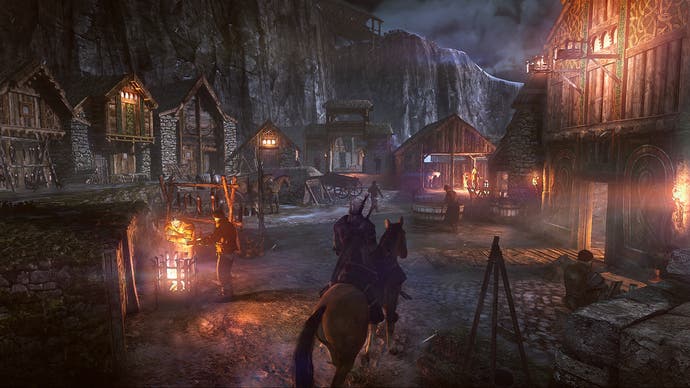
What we've seen so far of The Witcher 3 in screenshots has been nice but not jaw-dropping. This is a next-gen RPG: through it, people expect a sight of the future. Badowski explained the debut screenshots as being from a build of the game powered by an old renderer, which will be improved. "The overall visual quality is very important to us," he stressed. "High-quality visuals are our trademark."
That renderer will soon boast DirectX 11 "bells and whistles", but the initial focus was on creating a dynamic game world - beautification could come later. And with the game not due out until next year, "we have time to achieve it", Badowski said. Also: "I can tell you that screenshots are taken from our desktops and our policy is not to pimp up anything on screenshots."
The Witcher 3 will be CD Projekt Red's first PlayStation game (PS4). It's not been announced for the next Xbox yet, because the next Xbox itself hasn't been announced, but I expect it's a sure thing. "I cannot, err, I cannot... tell you," was Badowski's response about that version of The Witcher 3 when I spoke to him.
Badowski told me CDPR was one of the first European studios to get PS4 dev kits. He's not exactly sure when that happened, but the studio's had them for "six months for sure".
He's a fan of the PC-like architecture of PS4. "This time around the situation is much easier for developers," he said. "It's a good approach." And it means CDPR has been able to make single, global engine alterations to affect all versions of the game, rather than bespoke alterations for each. Less faff, more creativity.
"The overall visual quality is very important to us. High-quality visuals are our trademark."
Adam Badowski
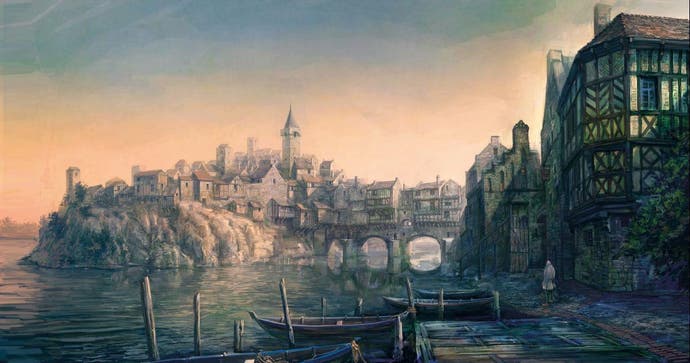
"It's powerful," he added, "but it's too early to compare [to PC] because they are first iterations of technology. We have to wait for a while to judge. I cannot tell you details and... it's quite a difficult situation!"
Besides being powerful, Sony's PlayStation 4 has some interesting features. One is its ability to let you play a game soon after you buy and start downloading it. "There are some technical constraints [and] goals related to this feature," Badowski said, talking from experience, "but nothing extraordinary." He thinks it was "a great decision" for Sony to put it in.
Another interesting PS4 feature is the DualShock 4 touchpad. We haven't seen how it can be used in games. How will The Witcher 3 utilise it? "Actually we don't know yet," Badowski responded. "The control scheme needs to be adjusted per platform, so you can expect that we will have dedicated teams for every platform in terms of controls." (Does this suggest the next Xbox version has a control method different enough to warrant specific design?)
"The touchpad gives us extra opportunities," he continued, "but it's too early to talk about because it's a highly specific thing and we need more time to develop something cool." The same goes for PlayStation Vita Remote Play, which allows PS4 games to be streamed and played on the Vita screen. "There are many cool features how to communicate PS4 with Vita and how to share experience between those two platforms," he said, "but for us it's too early: the game is huge and first things first."
Badowski also teased a possible PS4 cloud gaming-related announcement revolving around the topic of latency. "We are looking forward to news about..." he trailed off. "The most important thing is how to deal with the latency, and I know that there are great solutions in the air and you can expect some revolutionary solution. So I believe in cloud gaming."
Plus, Badowski wobbled when I asked him about the prospect of The Witcher 2 being put on PS3 now Sony has a relationship with the Polish developer. "I can't confirm anything," he said, hesitating. So I asked him if there was hope. He chuckled. "We'll see. We'll see," he said.
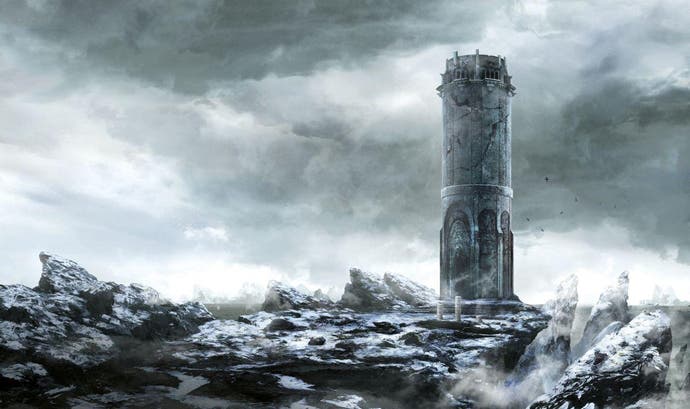
When The Witcher 3 was announced, Badowski knew people would question its open world direction. But the idea was always apparently for The Witcher to be open world.
It wasn't achievable with The Witcher 1 because it was built on BioWare's Aurora (Neverwinter Nights) engine. CDPR built its own engine for The Witcher 2 but felt it was a step too far to make an open world game as well. "Right now we are ready," Badowski said. And the reason why CDPR wanted an open world was so you could travel and see, first-hand, the impact your decisions have had on the world. You won't have to wait until the epilogue, in other words.
The technology CDPR has for The Witcher 3 sounds marvellous. Think back to Skyrim and the loading screens that greeted you every time you entered a city or an interior environment. They all added up. But you won't come across similar in The Witcher 3.
"For transitions between plains, forest/woods and cities, it will be seamless," confirmed Badowski. "You can travel from one point to another without any loading, and loading is in the background, so there's no difference between woods, plains, castles.
"The only difference is if we're going to have very dense internal locations. I'm talking about small, highly detailed rooms, and we are doing some prototypes. But I can't confirm it yet whether everything will be accessible without any loading; probably yes, but let me suspend the final answer."
Hero Geralt can explore the open world of The Witcher 3 in new ways, too. He can jump now, and he can climb. It's "not exactly" the climbing you'd find in a game like Assassin's Creed, said Badowski, "it's similar to what we have in Uncharted". "For example," he added, "climb up and there are special sequences, there are special animations built into the system."
"I didn't tell you that we want to kill Geralt!"
Adam Badowski
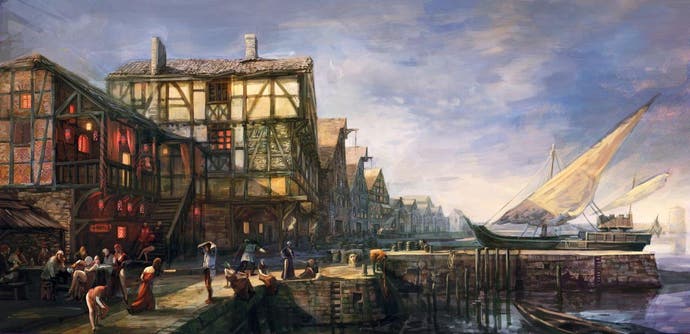
That's mixed with freer physics-based rambling. "You can go wherever you want, you can travel wherever you want," he said. "There are no invisible barriers in the world; you can jump down from the cliff and simply die."
Scripted quick-time events (QTEs) have been dumped for The Witcher 3. "We won't have any quick-time events," confirmed Badowski, and that lack of scripted battles means you can stumble upon and kill powerful monsters when you are only comparatively weak. "This time around you can defeat your enemy taking point by point," he said. "If you are good enough as a player you can do it," although "it will take hours and hours" to do so.
The Witcher 3 will also have a slow-motion ability you can use in combat to target vulnerable parts of monsters. It was thought that this was similar to Fallout 3's VATS system, but actually it's a part of the The Witcher 3's Senses mechanic. Geralt uses this to build up a detailed knowledge of his foe before battle. He can use his Senses to pick up tracks and spot clues that other people miss, and then he can literally deploy that accrued knowledge in battle. "And the game helps you," Badowski said, "slowing down a little bit, and you can use the perfect moment to have a killing blow. But it all depends on your knowledge."
You won't be able to kill civilians in the open world of The Witcher 3. That's to do with Geralt being a pre-defined character with a fiction he needs to adhere to. "I can't imagine that Geralt is going to the village and killing everybody," said Badowski. "It's just stupid. So we have to prevent such situations in some quests."
The Witcher 3 will be the final part of a story that began in The Witcher 1, but The Witcher series as a whole will live on. "This is the last part of The Witcher 3 saga," confirmed Badowski, "and we're going to close the story arc, the big one, and we're going to close all additional plots.
"What's next?" he mulled. "I have a lot of thoughts in my mind, but for now we don't have any strict plan." Is it possible to continue without Geralt, I asked. "I didn't tell you that we want to kill Geralt!" he replied.
The Witcher 3 is due at the end of next year and there's still much we don't know about it. For instance, will it have multiplayer (a first for the series)? "We're thinking about something," Badowski answered, "but I cannot explain it now. You can expect some information later on. Sorry for that!" I probed about whether it could be something similar to the Dark Arena mode in The Witcher 2. "I don't think so," he said.
You can be fairly confident, though, that CDPR doesn't have MMO ambitions for The Witcher series. "The story is not perfect for MMOs," said Badowski, and joked about how out-of-fiction it would be for 10 white-haired Geralts to be running around before him. "There are many different types of games that can fit better to the universe or lore," he said.
The Witcher 3: Wild Hunt still has a long way to go. CD Projekt has a lot of work to do and a lot of expectations to manage. An incredible amount of goodwill came out of The Witcher 2 and the Polish studio offering free DLC and other generous gestures. Will the same be possible with a simultaneous, multi-platform release this time around, and with the financial stakes raised that much higher? I hope so; one thing The Witcher series should never leave behind is its Polish. Ahem.
